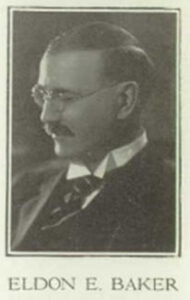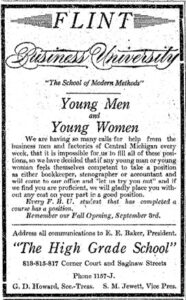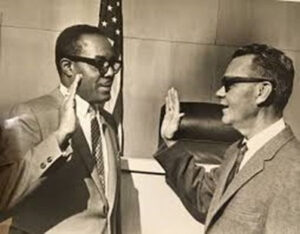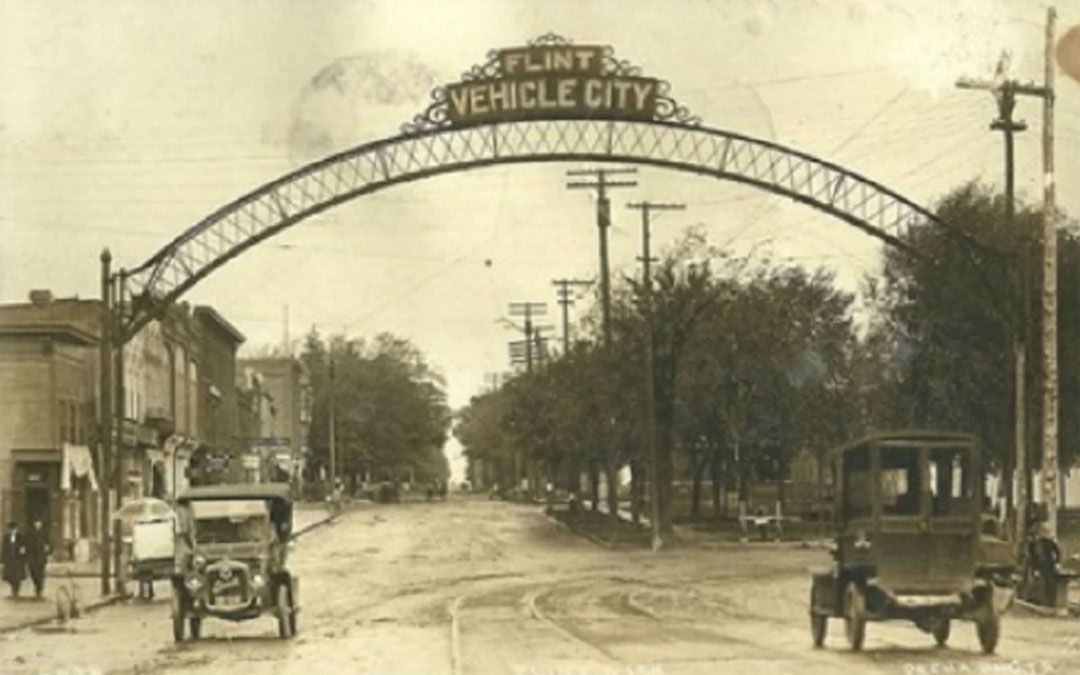Editor’s Note: In case you missed it last month, Michael Madden is working through Flint’s History from A to Z. Applewood and Avery Aldridge last month, Baker and Bivens this month.
 Eldon Baker, postmaster, a college, and a street. Ollie Bivens, Jr., the first Black Jurist in Flint and Genesee County, working toward an Alphabet of Flint.
Eldon Baker, postmaster, a college, and a street. Ollie Bivens, Jr., the first Black Jurist in Flint and Genesee County, working toward an Alphabet of Flint.
Baker College was once a huge presence in Flint and now all we have left is a former 40-acre campus and a street named Eldon Baker Drive. Who was Eldon Baker and why did he have a college and a street named after him?
Eldon E. Baker came to Flint in 1911 from Kansas and purchased Flint Business University. The school operated out of three store fronts, 813-815-817 on South Saginaw Street. Flint Business University soon was rebranded as Baker Business University and offered classes to help supply qualified office staff for the growing Buick Motor Car Company and Chevrolet.
Baker offered classes in three basic categories, ‘stenographic,’ civil service, and commercial. Students were able to select from a menu of twenty-three courses including all four types of shorthand, touch typewriting, business English and correspondence, penmanship, arithmetic, business arithmetic, geography, spelling, cost accounting, bookkeeping, and banking.
In 1916 the school moved to 129 East Kearsley across from the first U.S. Post Office on Harrison. By 1936 the growing institution needed to move and found a new home on the fifth floor of the Industrial Bank Building at 428 North Saginaw, now known as the Northbank Center.
Baker was accredited in 1924 by the National Association of Accredited Commercial Schools, lending legitimacy to the institution. Baker University offered day and evening classes and was price sensitive to the community. Tuition in 1916 was $10 a course or about $285 today. They also had a trial offer in 1916 where tuition was $1 for the first month.
Baker graduates found jobs easily in Flint.
The growing automobile industry needed trained employees for its offices to type, take shorthand, and manage correspondence. In the age before computers, payroll was calculated manually and checks written. After the passing of the Social Security Act in 1935 and payroll withholding was reinstated in 1943 with a W2 issued, the need for payroll clerks grew.
Eldon Baker was involved in the community as well as his school. He served on the board of Court Street Methodist Church for thirty-two years, served a term on the Flint Board of Education, a term as head of the Rotary Club of Flint and from 1923 to 1930 he was the president of the Flint Community Music Association.
Baker also took on another full-time job, Postmaster of Flint. He was appointed by President Calvin Coolidge and served until the beginning of the New Deal.
Under his tenure Flint was fortunate enough to get a new Federal Post Office on Grand Traverse. Today we know it as the Federal Building. The building opened on the 28th of September 1931, but the public was treated to an open house on the previous Friday with entertainment by the Flint Post Office Band. On Saturday there was a parade from the old Post Office at Kearsley and Harrison to the new building. Employees carried postal equipment through downtown along with floats depicting the progress of the postal delivery service, highlighted by a pony express rider astride his horse.
The success of Baker’s public life was not matched in his private life. Anna Baker, his wife, had been in poor health before the family came to Flint, she died in 1938. His elder son, Harold, died at age eighteen. His younger son, Basil, became an attorney, served in the county prosecutor’s office, the Department of Justice and later as a district court Judge in Flint. His daughter Lois was a schoolteacher and Baker brought her into the business. She began teaching at Baker in 1928 and became treasurer of the firm. Her husband, Merle McCormack, also joined the faculty.
When Eldon Baker died in 1953 his daughter and son-in-law took over the firm and Baker Business University seemed secure for another generation. Merle became the second president of Baker Business University and Lois continued as treasurer. All, however, did not go to plan, Lois became ill suddenly in 1954 and died. Merle remarried a few years later but then he and his second wife both died of carbon monoxide poisoning at their cottage near Grayling in 1959.
 The Baker estate sold the school to William Turner and Alex Adams in 1965. Turner bought Adams’ share of the business and then he in turn sold the school to Mr. Gail Jewell of Muskegon. In 1974, Baker was authorized to grant associate degrees and became Baker Junior College.
The Baker estate sold the school to William Turner and Alex Adams in 1965. Turner bought Adams’ share of the business and then he in turn sold the school to Mr. Gail Jewell of Muskegon. In 1974, Baker was authorized to grant associate degrees and became Baker Junior College.
The Jewell family moved the school to a site off Dort Highway near Atherton Road and established a campus with a dormitory to house out of town students.
In 1972 the Genesee Valley Indian Association petitioned the City of Flint to rename Manitou Avenue. Manitou is the great spirit in many Algonquian traditions and the Association felt it was an inappropriate name for a street. The city took recommendations from the community and Baker College suggested that it be renamed Eldon Baker Drive, the college administration building being located on the soon to renamed Manitou Avenue. There were no other serious suggestions, so in May 1973 Eldon Baker Drive came into being.
Baker Junior College became Baker College in 1986 when it was authorized to grant bachelor’s degrees. The College bought the former Mandeville School property in 1988 and moved the Flint area campus to the renovated site which eventually covered 40 acres. In 2020 Baker consolidated operations and closed the Flint campus moving out of the city it had started in back in 1911.
 Ollie Bivens Jr.’s family moved from Americus, Georgia to Flint in 1926 when Ollie was three years old. Like many, moving from the rural South during the Great Migration, the family came for the economic opportunities offered in the industrial North.
Ollie Bivens Jr.’s family moved from Americus, Georgia to Flint in 1926 when Ollie was three years old. Like many, moving from the rural South during the Great Migration, the family came for the economic opportunities offered in the industrial North.
Bivens graduated from Flint Northern High School and went on to attend Fisk University and Boston University School of Law. While at Fisk he met fellow student Julia Hawkins. They married in her hometown of Providence, Rhode Island in April 1949.
The couple moved to Nashville after the wedding and lived there before settling in Bivens hometown, Flint. He opened his law practice in 1956 with offices at 1216 Oregon Avenue.
Oregon Avenue was in the St. John area, a vibrant but poor neighborhood that was excised from the landscape as I-475 was built.
Urban renewal in the 1970s meant urban removal, and the state and city eliminated what they considered a less desirable neighborhood to build a highway to serve the massive Buick manufacturing complex on Flint’s north side.
Bivens had been building his private law practice for nearly a decade when he was appointed a trial attorney in the Genesee County Prosecuting Attorney’s Office in 1965.
Hard work and skill paid off and from 1966-1968 he served as the chief trial attorney in the prosecutor’s office. His diligence was noted, and he was appointed to a vacancy on the Flint Municipal Court in 1968. He was the first Black judge on the Flint Court.
In 1963 the new Michigan Constitution mandated the abolition of Justices of the Peace and Circuit Court Commissioners in five years.
A new court was to be established, the district court, where judges were to be full time, have formal legal training and to be paid a salary rather than through fees.
Bivens’ Municipal Court position now became a District Court position as Flint made its Municipal Court a District Court under the constitutional reform. Bivens therefore became not only one of the first district court judges in Flint, but he also became the first Black district court judge.
He ran for the position in 1971 and won an eight-year term on the district court bench. One year later in 1972 he was appointed to a vacancy of the Genesee County Circuit Court bench by Governor William Milliken.
He was the first Black judge on the Genesee Circuit. In 1974 he won election to the position for an eight-year term.
Judge Bivens lost his reelection fight in 1982 to attorney Judith Fullerton.
Before and after his retirement Judge Bivens was active in many local organizations including the Sierra Club, Boy Scouts, the Urban League, Knights of Columbus, Genesee County Legal Aid, Phi Delta Phi and Kappa Alpha Psi.
Former Judge Ollie B. Bivens died on March 16, 1999, at age 75.






